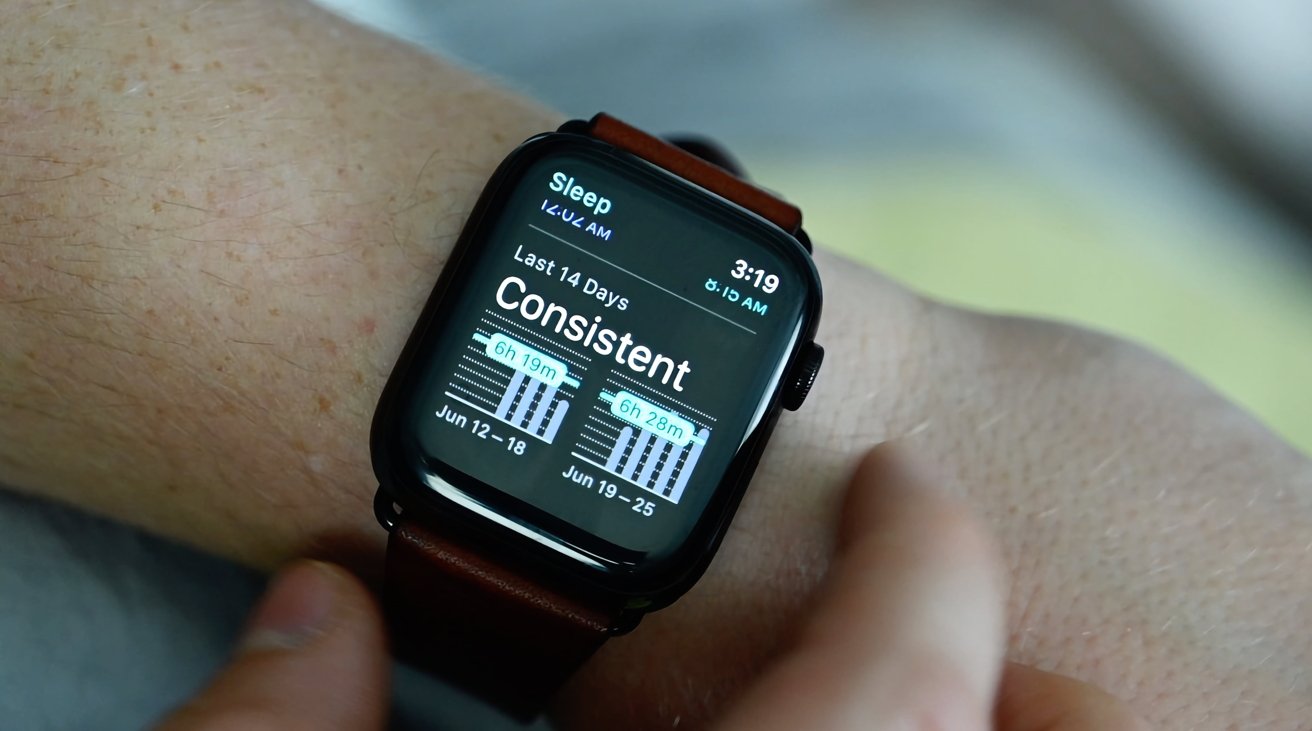Apple Watch study says you need to get more sleep
Data generated by the Apple Watch for the Apple Heart and Movement Study indicates that most people don't get enough sleep at night, and that people in Idaho get more sleep than West Virginia.

Wear an Apple Watch at night to see how well you sleep.
The Apple Heart and Movement Study was formed by Apple and Brigham and Women's Hospital, as well as the American Heart Association, in 2019 to initially look into early warning signs for atrial fibrillation (AFib). In a March data release, the same data demonstrates that people need to spend more time sleeping.
An update focusing on sleep released on March 7 reveals the average amount of time spent sleeping by project participants was 6 hours and 27 minutes. A mere 31.2% of people manage to achieve seven or more hours of sleep, meeting the minimum recommended by the AHA.
Most people manage between six and seven hours, with 39.7% of sleep reporters reaching that. Another 20.3% get between five and six hours a night, and 8.8% have less than 5 hours.

Sleep is considered an important area for health and wellness, with duration and consistency linked to various health topics including cardiovascular disease, metabolism, and brain health, explains BWH.
The same data set also revealed that participants in Washington, South Dakota, and Idaho are more likely to meet the minimum sleep recommendation. Those in Hawaii, Mississippi, and West Virginia are least likely to do so.
Researchers also spotted a fair bit of variance in when people go to sleep on a weekday versus a weekend. As you would expect, most people go to sleep before midnight on a weekday, with 66.4% doing so.
However, by the weekend, the chart as a while shifts later, with 56.6% hitting the hay before 12am.
The data is based on results from over 42,000 people who opted into the study on their Apple Watch and iPhone, via the Apple Research app.
The BWH offers advice to track sleep and improve sleep habits, including establishing a routine and staying as consistent with your sleep as possible. To measure slumber, it's suggested to set up sleep tracking on the Apple Watch, so you can see how you're resting over time.
Read on AppleInsider
Wear an Apple Watch at night to see how well you sleep.
The Apple Heart and Movement Study was formed by Apple and Brigham and Women's Hospital, as well as the American Heart Association, in 2019 to initially look into early warning signs for atrial fibrillation (AFib). In a March data release, the same data demonstrates that people need to spend more time sleeping.
An update focusing on sleep released on March 7 reveals the average amount of time spent sleeping by project participants was 6 hours and 27 minutes. A mere 31.2% of people manage to achieve seven or more hours of sleep, meeting the minimum recommended by the AHA.
Most people manage between six and seven hours, with 39.7% of sleep reporters reaching that. Another 20.3% get between five and six hours a night, and 8.8% have less than 5 hours.

Sleep is considered an important area for health and wellness, with duration and consistency linked to various health topics including cardiovascular disease, metabolism, and brain health, explains BWH.
The same data set also revealed that participants in Washington, South Dakota, and Idaho are more likely to meet the minimum sleep recommendation. Those in Hawaii, Mississippi, and West Virginia are least likely to do so.
Researchers also spotted a fair bit of variance in when people go to sleep on a weekday versus a weekend. As you would expect, most people go to sleep before midnight on a weekday, with 66.4% doing so.
However, by the weekend, the chart as a while shifts later, with 56.6% hitting the hay before 12am.
The data is based on results from over 42,000 people who opted into the study on their Apple Watch and iPhone, via the Apple Research app.
The BWH offers advice to track sleep and improve sleep habits, including establishing a routine and staying as consistent with your sleep as possible. To measure slumber, it's suggested to set up sleep tracking on the Apple Watch, so you can see how you're resting over time.
Read on AppleInsider

Comments
Yes, it is not a perfect analogy and does not apply to discovering undiagnosed conditions. But there has been a strong demand for sleep tracking devices for several years for a reason, long before Apple dipped its toe into the water with the Apple Watch. I don't think the demand is driven as much by a lot of people wondering whether they have sleep issues, but rather by people who know they have sleep issues and are trying to get these issues under control. So seeing yet another study that states "we need to get more sleep" seems like we're simply restating what we already know at a very wide and deep level.
Again, Apple is doing pretty much everything it can do to help people get the help they need in this area. Screen time limits, blue light reduction, sleep monitoring, promoting healthy lifestyles, etc., reiterate Apple's awareness and knowledge of sleep issues. I hope they continue to build on what they've started by adding snore detection, oxygen saturation level monitoring, temporary loss of breathing detection, restless leg syndrome detection, and similar diagnostics from the sleep health field. Apple knows there is a well known problem and has been building products that hope to address the known issues, as have many other vendors.